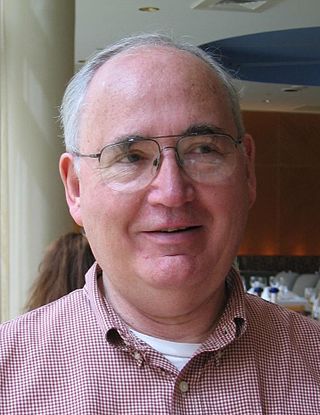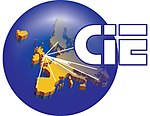
Computer science is the study of computation, information, and automation. Computer science spans theoretical disciplines to applied disciplines. Though more often considered an academic discipline, computer science is closely related to computer programming.

In theoretical computer science and mathematics, the theory of computation is the branch that deals with what problems can be solved on a model of computation, using an algorithm, how efficiently they can be solved or to what degree. The field is divided into three major branches: automata theory and formal languages, computability theory, and computational complexity theory, which are linked by the question: "What are the fundamental capabilities and limitations of computers?".

Dana Stewart Scott is an American logician who is the emeritus Hillman University Professor of Computer Science, Philosophy, and Mathematical Logic at Carnegie Mellon University; he is now retired and lives in Berkeley, California. His work on automata theory earned him the Turing Award in 1976, while his collaborative work with Christopher Strachey in the 1970s laid the foundations of modern approaches to the semantics of programming languages. He has also worked on modal logic, topology, and category theory.
Zohar Manna was an Israeli-American computer scientist who was a professor of computer science at Stanford University.
The expression computational intelligence (CI) usually refers to the ability of a computer to learn a specific task from data or experimental observation. Even though it is commonly considered a synonym of soft computing, there is still no commonly accepted definition of computational intelligence.
Dov M. Gabbay is an Israeli logician. He is Augustus De Morgan Professor Emeritus of Logic at the Group of Logic, Language and Computation, Department of Computer Science, King's College London.

The Donald E. Knuth Prize is a prize for outstanding contributions to the foundations of computer science, named after the American computer scientist Donald E. Knuth.

S. Barry Cooper was an English mathematician and computability theorist. He was a professor of Pure Mathematics at the University of Leeds.

Moshe Ya'akov Vardi is an Israeli mathematician and computer scientist. He is the Karen Ostrum George Distinguished Service Professor in Computational Engineering at Rice University, United States. and a faculty advisor for the Ken Kennedy Institute. His interests focus on applications of logic to computer science, including database theory, finite model theory, knowledge of multi-agent systems, computer-aided verification and reasoning, and teaching logic across the curriculum. He is an expert in model checking, constraint satisfaction and database theory, common knowledge (logic), and theoretical computer science.
In mathematical logic, monadic second-order logic (MSO) is the fragment of second-order logic where the second-order quantification is limited to quantification over sets. It is particularly important in the logic of graphs, because of Courcelle's theorem, which provides algorithms for evaluating monadic second-order formulas over graphs of bounded treewidth. It is also of fundamental importance in automata theory, where the Büchi–Elgot–Trakhtenbrot theorem gives a logical characterization of the regular languages.
The Alan Turing Year, 2012, marked the celebration of the life and scientific influence of Alan Turing during the centenary of his birth on 23 June 1912. Turing had an important influence on computing, computer science, artificial intelligence, developmental biology, and the mathematical theory of computability and made important contributions to code-breaking during the Second World War. The Alan Turing Centenary Advisory committee (TCAC) was originally set up by Professor Barry Cooper
Informatics is the study of computational systems. According to the ACM Europe Council and Informatics Europe, informatics is synonymous with computer science and computing as a profession, in which the central notion is transformation of information. In some cases, the term "informatics" may also be used with different meanings, e.g. in the context of social computing, or in context of library science.

Rodney Graham Downey is a New Zealand and Australian mathematician and computer scientist, an emeritus professor in the School of Mathematics and Statistics at Victoria University of Wellington in New Zealand. He is known for his work in mathematical logic and computational complexity theory, and in particular for founding the field of parameterised complexity together with Michael Fellows.
The EATCS–IPEC Nerode Prize is a theoretical computer science prize awarded for outstanding research in the area of multivariate algorithmics. It is awarded by the European Association for Theoretical Computer Science and the International Symposium on Parameterized and Exact Computation. The prize was offered for the first time in 2013.

Benedikt Löwe is a German mathematician and logician working at the universities of Amsterdam, Hamburg, and Cambridge. He is known for his work on mathematical logic and the foundations of mathematics, as well as for initiating the interdisciplinary conference series Foundations of the Formal Sciences and Computability in Europe.
Bruno Courcelle is a French mathematician and computer scientist, best known for Courcelle's theorem in graph theory.

Joel David Hamkins is an American mathematician and philosopher who is O'Hara Professor of Philosophy and Mathematics at the University of Notre Dame. He has made contributions in mathematical and philosophical logic, set theory and philosophy of set theory, in computability theory, and in group theory.
ACM SIGLOG or SIGLOG is the Association for Computing Machinery Special Interest Group on Logic and Computation. It publishes a news magazine, and has the annual ACM-IEEE Symposium on Logic in Computer Science (LICS) as its flagship conference. In addition, it publishes an online newsletter, the SIGLOG Monthly Bulletin, and "maintains close ties" with the related academic journal ACM Transactions on Computational Logic.
Dag Normann is a Norwegian mathematical logician. He was born in 1947 and is Professor emeritus at the University of Oslo. His research focuses on computability theory with an emphasis on mathematical models for typed algorithms and applications of the foundations of mathematics.
Elvira Mayordomo Cámara is a Spanish computer scientist specialising in the theory of computation. She is professor at the University of Zaragoza and currently the President of the Association Computability in Europe.









